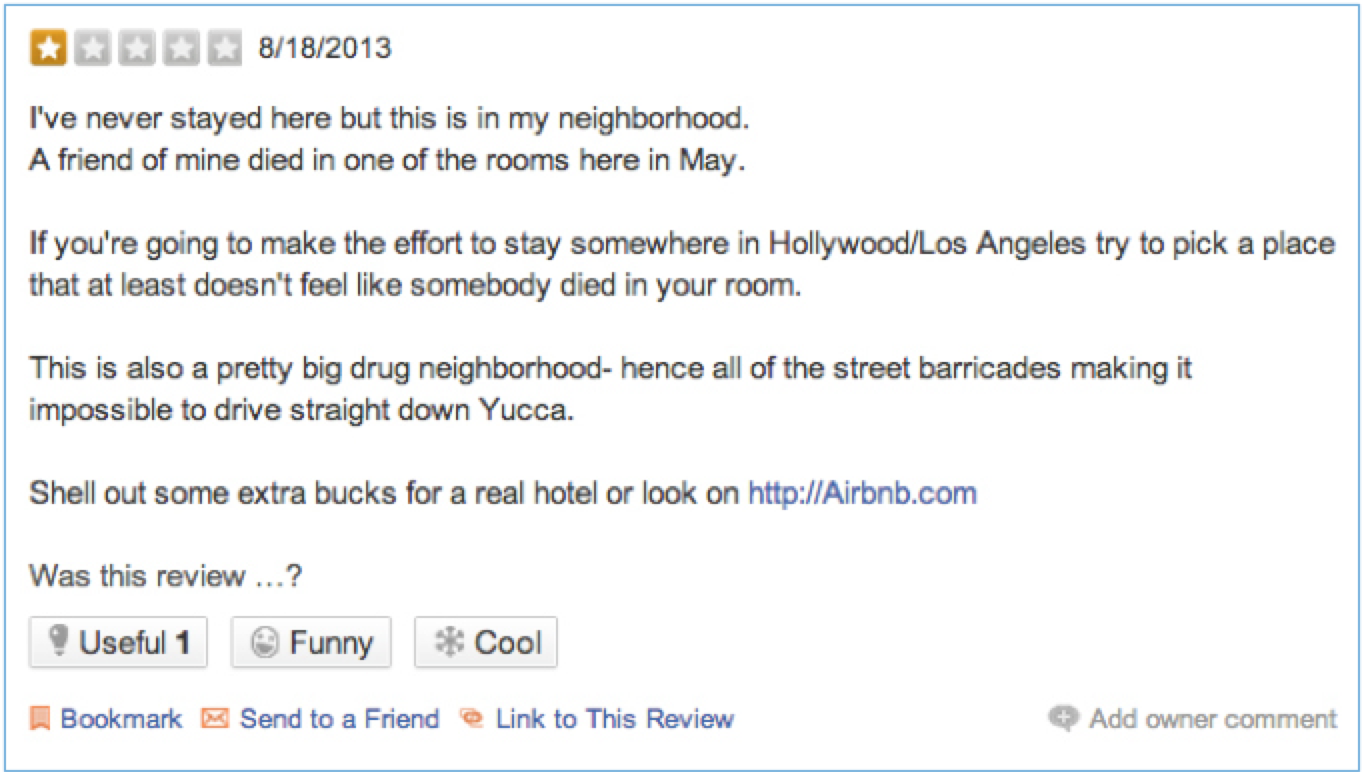
Founded in 2004, Yelp is one of the largest crowd sourced business recommendation networks on the internet. Yelp has more than 174 million unique monthly users and upwards of 110 million reviews on businesses that range from tattoo parlors and doggy day camps, to plumbers and personal injury lawyers.
Thus, it should come as no surprise to business owners and service providers that favorable reviews on these sites can return favorable results to their bottom line. Conversely, a scathing review can turn your online reputation upside down. By way of example, check out this one-star rating from Yelp …

As you can see, Yelp users have no problem speaking their mind. When does a less than favorable Yelp review go from just a negative review, to an actionable case of defamation?
What Kind of Review Constitutes Defamation?
In Texas, to put forth a valid defamation claim a plaintiff must prove that the defendant: (1) published a statement; (2) that was defamatory concerning the plaintiff; (3) while acting with either actual malice, if the plaintiff was a public official or public figure, or negligence, if the plaintiff was a private individual, regarding the truth of the statement.
In plain English, a defamatory statement has to assert a false defamatory fact, not just an opinion.
A false statement of fact that harms the reputation of a business is not protected by the First Amendment right to free speech. For example, in the Yelp review above the reviewer states that the hotel “feel[s] like somebody died in your room.” This is clearly just the reviewer’s opinion. But if the reviewer had falsely claimed that the hotel bell boy stole the reviewer’s luggage, then the hotel would likely have a claim for defamation.
Who Can You Sue for a Bad Yelp Review?
The Communications Decency Act of 1996 section 230 offers broad protection for internet sites. The Act differentiates between internet services who allow third parties to post on their site and publishers of original content. The Act states, "[n]o provider or user of an interactive computer service shall be treated as the publisher or speaker of any information provided by another information content provider". Because sites such as Yelp are not classified as publishers, they are not legally liable for reviews posted by third parties who use their services. In lay terms you might think of this as a “don’t shoot the messenger” approach. Thus, as long as Yelp does not modify the third party user’s review, they can not be held liable for the defaming content posted by such a third party.
What to Do When You Get get a Bad Review Yelp Review?
If you operate a business long enough, it is almost certain that you will have a client or customer that is not one hundred percent satisfied. It is likely that an unhappy client will voice their discontent on Yelp at some point in time. What do you do?
Challenge the review. If you would like to have the review taken down, you can report it to Yelp via their support page. However, a report is seldom grounds for removing a post. It is worth a try nonetheless. What other measures should you take?
Post a public reply. Yelp gives you, the business owner, an opportunity to tell your side of the story in a public reply. However, you will want to use a tactful strategy so as not to inflame the situation and make it worse. Bury the review by getting positive reviews. You can bury the review by soliciting new positive reviews from satisfied clients and customers.
These new reviews will populate your Yelp account by showing up ahead of the older reviews and will force the negative review further down the page or onto a second page. A word of caution, do not have your friends or family create fake reviews. Yelp has recognized this issue and uses proprietary review filter software to sift their reviews.
In sum, be vigilant about your efforts to find out what consumers are saying about your business or service on Yelp. We have all Googled ourselves. Don’t forget to Yelp yourself. If you find you or your business in the crosshairs of a potentially libelous review on Yelp, be proactive in your approach to mitigate the damage.
Sources Used for Article:
http://www.ranking.com
https://www.yelp.com/factsheet
WFAA-TV, Inc. v. McLemore, 978 S.W.2d 568, 571 (Tex. 1998).
Communications Decency Act of 1996 (CDA).
Communications Decency Act of 1996 (CDA).
https://www.yelp-support.com/article/Will-Yelp-remove-a-false-or-defamatory-review?l=en_US
https://www.yelpblog.com/2013/09/fake-reviews-on-yelp-dont-worry-weve-got-your-back
Save









